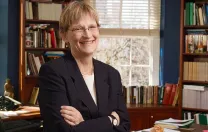Two years ago, Drew Gilpin Faust began looking for a date when women presidents of Ivy League universities could convene for a panel discussion as part of the Radcliffe Institute’s “Voices of Public Intellectuals” series. By the time that Penn president emerita Judith Rodin; Princeton’s Shirley Tilghman; Brown’s Ruth Simmons; and Rodin’s successor, Amy Gutmann (listed in their order of appointment) sat down in an arc of Harvard chairs flanking Faust, circumstances had so changed that she said, to laughter and applause, “I have arranged a tutorial for myself.”

Justin Ide / Harvard News Office
May 2007: Ivy League presidents Simmons, Rodin, Gutmann, andTilghman (left to right) in conversation with president-elect Faust(center) Of the institute's intellectual program, Faust wrote, "Crossingboundaries is fundamental to the Radcliffe experience."
The tutorial, held before a full house in the Loeb Theatre on May 2, gave some sense of the speakers’ paths to their current eminence, and of the challenges of running a university. For the most part, the visitors were surprised to find themselves moving from scholarship into management and positions of leadership; most noted the support and critical interventions of helpful mentors. Tilghman, who said she had wanted to be a scientist since she was five years old, observed that her career as a biologist had been pertinent because women in science during the past 25 years have needed three essential traits to survive: determination; humor; and—in light of the challenges posed to their success—an “absolute inability to recognize reality.”
Explicitly or otherwise, the presidents seemed to share what Gutmann described as their “incredible ambitions for our own institutions” as engines of knowledge and human betterment for those they educate. She also noted the “endless difficulties” of realizing those ambitions: “No one should be under the illusion that this is the type of job that everyone wants to do.”
Faust, who moderated (but withheld her own views), asked if there was a female leadership style particularly suited to academic institutions. Simmons declared that idea “nonsense.” Tilghman observed that universities are “very strange beasts,” built to an unusual degree on “conversation, consultation, mutual respect.” Socialization as a girl in America, she thought, promoted skills that work well in such settings—but she also pointed out that the president then has to make a decision, choosing one direction from among others that may also be plausible. Gutmann said a president would use every skill she had to move her institution forward, so the multitasking demanded of contemporary mothers could prove useful.
The guests had plenty of ideas about the biggest challenges universities face. Their institutions, Tilghman said, are “the most effective engines for social mobility in this country. In fact, I don’t even know who is number two.” But there are impediments to access. Gutmann cited conversations with government officials concerned about the “threat of China” who advocate controlling access to labs and limiting student and scholar exchanges. Simmons highlighted the deplorable state of K-12 education in this country and the stunting effect that has on most students and on society as a whole.
Given those problems, and others (of intrusions into the academy, Tilghman said, “The day we let someone in Washington decide what should be the curriculum in classes is the day we should all pack up and go home”), Rodin suggested that campus leaders had an exceptional opportunity to be role models within their own communities: “the beacons and activists” for civic engagement and honest discourse, exemplifying university values for students. Gutmann urged her peers to carry the message about the worth of a broad education in the liberal arts and sciences across the land and around the world. And Rodin said she saw in the four women who have followed her to Ivy League presidencies—a “pretty amazing” group—a new generation of leaders eager and able to do just that.
(A video of the entire discussion is available at www.radcliffe.edu/events/lectures/2007_vpi.php.)






